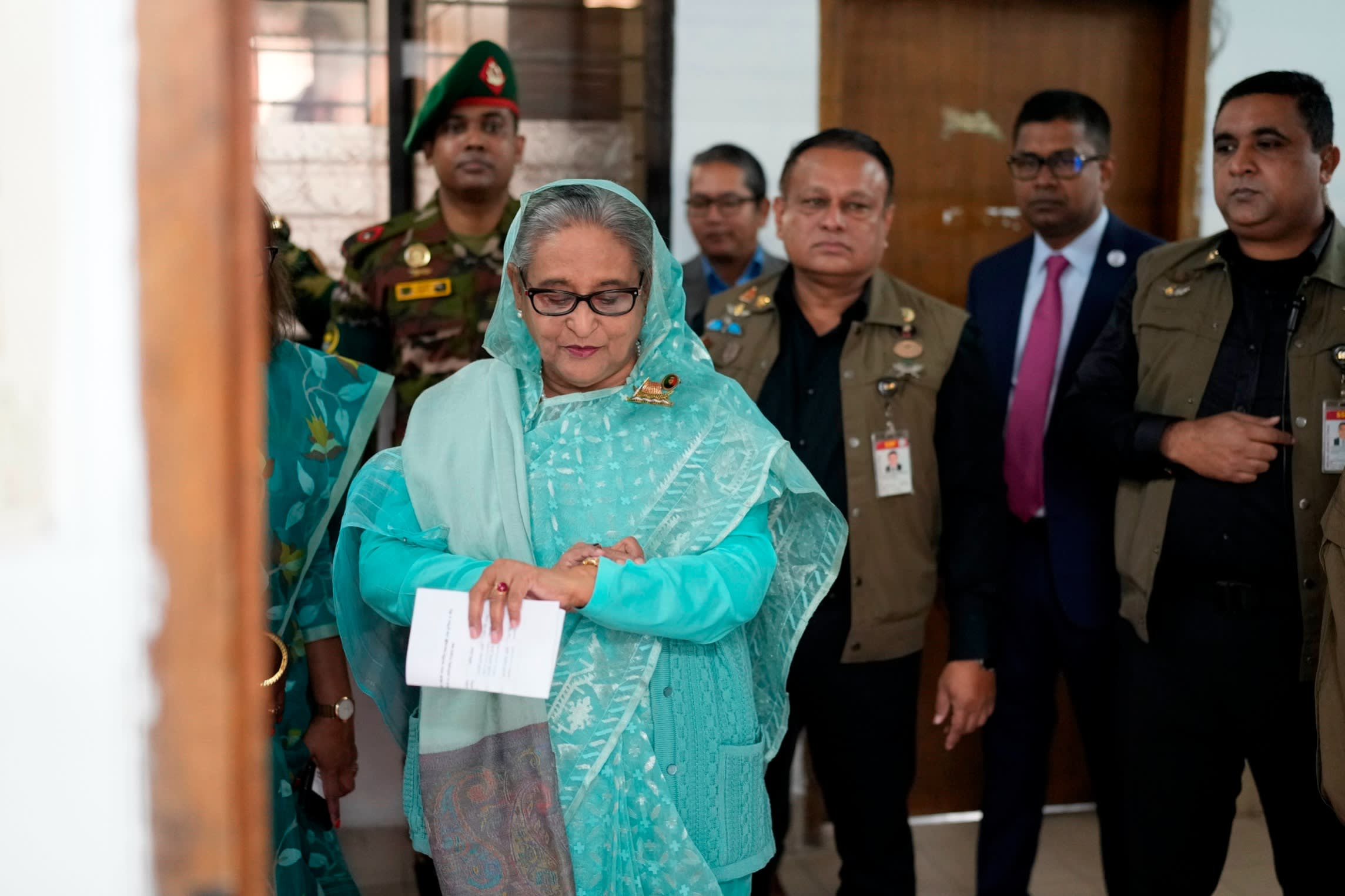Unlock the Editor’s Digest for free
Roula Khalaf, Editor of the FT, selects her favourite stories in this weekly newsletter.
Sheikh Hasina has extended her two-decade rule over Bangladesh after a crackdown on her rivals eased the path to victory at Sunday’s election and highlighted the geopolitical rift between the US and rising Asian powers.
The prime minister’s Awami League party went into the vote practically unchallenged after authorities arrested thousands of members of the main opposition Bangladesh Nationalist party in the weeks leading up to the polls in the country of 170mn.
The BNP boycotted the vote, leaving a collection of little-known parties and independent candidates, many of whom appeared to be running with the Awami League’s support, in their place.
Sheikh Hasina’s party won 223 of the parliament’s 300 seats, according to preliminary results. Speaking to journalists on Monday, Sheikh Hasina hailed the result as “an epoch-making moment for our country and our national history” and dismissed the BNP as a “terrorist party”.
“If any party doesn’t participate in the election, it doesn’t mean there’s no democracy,” she said.
Even if Sheikh Hasina — the world’s longest-serving incumbent female leader, who headed Bangladesh between 1996 and 2001 and again since 2009 — remains in power, analysts said her government would find it challenging to convince many at home and abroad of its legitimacy.
“Whoever [people] vote for, it’ll go in the Awami League’s favour,” said Kamal Ahmed, a columnist and political analyst. “So it’s not a real election. It doesn’t reflect people’s voice or people’s mind.”

The election in Bangladesh, the world’s second-largest garments exporter after China, has attracted intense diplomatic manoeuvring from rival powers. Sheikh Hasina has enjoyed staunch support from India and China, who despite their own fierce rivalry see her as a force for regional stability and a bulwark against Islamism.
But the US and some European countries have taken increasingly confrontational stances with the prime minister over her authoritarian slide and proximity to Beijing, with Washington introducing sanctions targeting human rights violations and election interference.
Sheikh Hasina’s government will also have to tackle mounting economic and financial pressures, including rising inflation and falling foreign reserves, that have left many Bangladeshis disillusioned with her rule.
Civil society figures warn these challenges are pushing the government towards increasingly authoritarian tactics, detaining political rivals and cracking down on non-governmental organisations and journalists to consolidate control.
“The vote doesn’t matter to me. Things have become very difficult,” said Mohammad Iqbal, a 36-year-old labourer in a Dhaka slum near a polling centre who was shunning the election. “Earlier, election day was like [the festival of] Eid. But now I don’t see any happiness.”
Voting was marred by several instances of violence around the country and allegations of irregularities such as ballot-stuffing in some constituencies. Turnout fell sharply: officials said about 40 per cent of eligible voters participated, down from around 80 per cent in 2018. The BNP claimed the true figure this time was even lower.
The ruling party launched a push to boost turnout on Sunday, with mixed results. Outside one polling station in Dhaka, an ocean of Awami League party activists and local camera crews vastly outnumbered the trickle of voters. At another polling station near a slum, several voters said they had been promised a free lunch of chicken biryani if they came.
Many of those who voted appeared to be staunch supporters of Sheikh Hasina. “The candidates who aren’t participating are not my problem,” said Shamima Akhter, a 43-year-old teacher, of the opposition boycott. “We believe she’ll come again fairly.”
The BNP denounced the polls, saying it planned to scale up demonstrations to rebuild momentum and put pressure on Sheikh Hasina.
“When you form a government through this process where you don’t have the people’s mandate, it makes it harder to make the right decisions that we’ll need to face the economic challenges ahead,” said Tabith Awal, a member of the BNP’s national executive committee.
Analysts are also watching for international reaction amid widespread speculation that the US, the biggest destination for Bangladesh’s garment exports, could implement further penalties after the polls if it concluded they were unfair.
Avinash Paliwal, a political scientist at Soas University of London, said that while the west was unlikely to go beyond narrowly targeted measures, “what can happen are some really sharp-edged sanctions on people who are close to the regime”.
“That sends a clear political signal [that] the west is also playing a long game,” he said.

